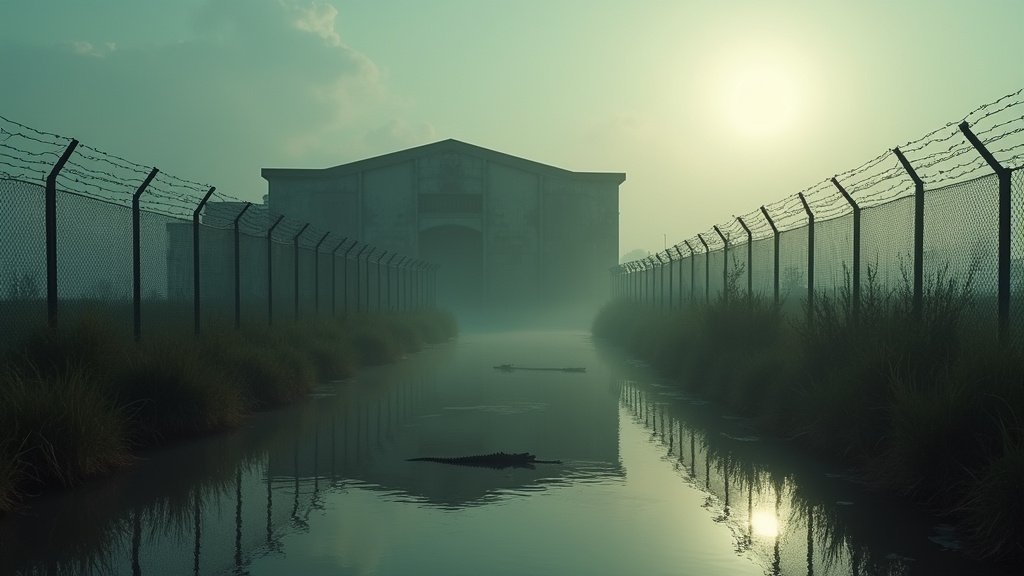MIAMI, FL – A significant development in the unfolding legal saga surrounding the highly contentious “Alligator Alcatraz” immigration detention center in the Florida Everglades unfolded this week, as a federal judge in Miami issued a split decision in a civil rights lawsuit challenging the facility’s operations. The ruling by U.S. District Judge Rodolfo Ruiz dismissed a portion of the claims while transferring the remaining, critical allegations to a different jurisdiction, ensuring the legal battle over detainee rights remains a trending topic in immigration news.
The Judge’s Split Decision
In a detailed 47-page ruling issued late Monday, Judge Ruiz addressed a lawsuit brought by civil rights attorneys concerning the legal rights of detainees at the Everglades facility. The judge’s decision rendered moot claims that detainees lacked confidential access to their lawyers or to immigration court hearings. This particular aspect of the lawsuit was dismissed because the Trump administration, in a strategic move just days prior to the ruling, officially designated the Krome North Processing Center near Miami as the designated site for these cases to be heard.
However, the legal fight is far from over. Judge Ruiz simultaneously granted a motion to transfer the remaining claims, specifically those alleging First Amendment violations, to the Middle District of Florida. These ongoing claims include serious allegations of delays in scheduling private meetings between detainees and their attorneys, as well as a pervasive lack of confidentiality during phone or videoconference communications.
A Tortured Procedural History
The lawsuit, officially filed on July 16, weeks after the first detainees were transferred to the newly established facility, has been characterized by Judge Ruiz as having a “tortured procedural history.” Indeed, the legal landscape surrounding the facility, whose official name is the South Detention Facility and which operates out of the Dade-Collier Training and Transition Airport, has been fluid. Civil rights attorneys, including those from the American Civil Liberties Union (ACLU) of Florida and Americans for Immigrant Justice, initially sought a preliminary injunction to compel federal and state authorities to ensure detainees’ access to legal counsel and court hearings.
The federal and state governments had consistently argued that Florida’s Southern District was the improper venue for the lawsuit. Their contention stemmed from the detention center’s location primarily within Collier County, which falls under the Middle District of Florida, despite the property’s ownership by Miami-Dade County. Judge Ruiz had previously hinted at his concerns regarding the appropriate jurisdiction, leading to the eventual transfer of a significant portion of the case.
Krome North’s Enduring Role and Controversial History
The Trump administration’s designation of the Krome North Processing Center as the jurisdictional immigration court for “Alligator Alcatraz” detainees effectively addressed one of the plaintiffs’ core grievances. DHS Secretary Kristi Noem filed a “notice of material development” confirming this new arrangement. However, ACLU lead attorney Eunice Cho strongly asserted that this governmental shift was a direct consequence of the legal challenge, stating, “It should not take a lawsuit to force the government to abide by the law and the Constitution.”
Krome North itself is no stranger to controversy, with a long and troubled history as a major immigration detention facility in the Miami area. Established in the 1980s to process an influx of Mariel boatlift refugees and Haitians, Krome has faced repeated accusations of overcrowding, unsanitary conditions, sexual assault by guards, and medical neglect. Recent reports, including a 2021 civil rights complaint, have highlighted issues of anti-Black racism, COVID-19 negligence, and other abuses. A 2024 inspection report by the DHS Inspector General specifically noted that Krome staff did not fully comply with standards for access to legal resources.
Lingering Concerns and Broader Implications
Despite the partial dismissal and transfer of the case, significant concerns for detainee rights persist. While the Fifth Amendment claims regarding court access have been deemed moot, the First Amendment allegations concerning the confidentiality and swiftness of legal counsel access remain very much alive. Detainees have reported meeting with lawyers via videoconference, but alleged these sessions lacked confidentiality due to staff proximity.
Furthermore, civil rights attorneys have documented instances of detainees being pressured by officers to sign voluntary removal orders before consulting with counsel, with some even facing deportation despite not having final removal orders. These allegations, coupled with reports of harsh conditions like overcrowding, poor sanitation, and inadequate medical care, underscore the ongoing struggle for basic human rights within the detention system.
Florida Governor Ron DeSantis’s spokesperson, Alex Lanfranconi, confirmed that “Alligator Alcatraz” would remain operational, emphasizing its role as a “force multiplier to enhance deportation efforts.” This statement signals the state’s continued commitment to the facility, which reportedly held 1,000 people and has a capacity for 2,000.
This legal news is unfolding against the backdrop of another significant lawsuit. Environmental groups and the Miccosukee Tribe have filed a separate legal challenge seeking to halt construction and operations at the Everglades detention center, arguing non-compliance with federal environmental laws. U.S. District Judge Kathleen Williams previously ordered a 14-day halt on construction in that case, indicating multiple fronts of legal scrutiny for the controversial facility.
The split ruling by Judge Ruiz marks a pivotal moment in this high-stakes civil rights case, shifting the venue for crucial First Amendment arguments. While one aspect of the legal challenge has concluded due to the government’s timely intervention, the broader fight for comprehensive and confidential legal access for detainees at facilities like “Alligator Alcatraz” continues, reinforcing the ongoing national discussion around immigration detention and human rights.





